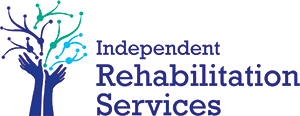How Telehealth communication groups have helped individuals with Traumatic Brain Injury (TBI) practice their social communication skills with one another.
by Matt Fong, Speech Pathologist.
In the midst of the Coronavirus (COVID-19) pandemic, the resulting lockdown restrictions have resulted in countless people feeling socially isolated. With many of us unable to see our friends or family in person, effective communication skills have never been more important as we seek to connect whilst being physically apart.
For individuals who have sustained a traumatic brain injury (TBI), these feelings of social isolation may be magnified during COVID-19 as a result of cognitive-communication difficulties. A cognitive-communication disorder is defined as difficulty with any aspect of communication as a result of a cognitive impairment, such as reduced attention, memory, organisation, problem solving or executive functioning.
While basic communication skills are generally intact after TBI, a person’s social communication skills are often affected, which can manifest in difficulties such as lack of eye contact, impaired turn taking, poor topic maintenance and reduced initiation of conversational topics. Most devastatingly, individuals with a TBI can experience diminished social relationships, significantly reduced return to work outcomes, difficulties reintegrating back into the community, and overall, poorer social participation and quality of life.
Knowing what we know about the impact of TBI on social participation outcomes, a significant question was posed to rehabilitation clinicians when the first COVID-19 restrictions hit Melbourne in March, 2020—‘”How can we continue to help our clients with their social and community access goals when we were all being asked to stay inside our homes?” At Independent Rehabilitation Services (IRS), we sought to answer this question whilst making the transition to the (relatively) unknown world of providing telehealth services. IRS is a community-based private practice consisting of occupational therapists, physiotherapists and speech pathologists, based in Ashburton, Victoria. The practice specialises in neurological and general rehabilitation, and clinicians routinely travel to client’s residences, workplaces or their communities in metropolitan and outer suburban Melbourne, in order to help them achieve their functional and participation-related goals.
For many of our clients, the first stage of lockdown restrictions were a major disruption to their weekly routines. Many of the social opportunities that they had to practice their communication skills in a functional setting, such as attending local community groups or volunteering at organisations, had been suspended. Regular face-to face sessions with allied health clinicians were now taking place over a computer screen, and for some clients who were already socially isolated and living alone before COVID-19, this meant that they no longer had anyone who could check in on them physically at home. There was a significant risk that our clients with TBI would now be more isolated and experience greater emotional distress, as a result of the lockdown restrictions.
During a one-to-one telehealth speech pathology session, a client raised the question of whether he could be connected with another person who also had a TBI so that he could continue to practice his communication skills with other people. His goal was to remain on topic during conversations, something that he had previously been practising at work but could no longer do due to his workplace being shut down. Although he was still able to practice this skill in telehealth sessions with his speech pathologist, now that he was spending most of his day at home by himself, there was limited opportunity for carry over and he was worried that his social communication skills client asked whether he could connect with other people to practice his communication skills, it was as if a light bulb had gone off— “what if we started a communication group online to help individuals with TBI connect with one another?”
The benefits of group therapy for individuals with TBI to work on their communication skills are well documented. Practising in a group setting enables participants to learn from one another and share their experiences and strategies about living with a TBI. Conversations also occur in a more realistic social environment, something that cannot be as easily replicated in individual speech pathology sessions. The idea of running communication therapy in groups where participants all gathered physically in the same room had been considered many times at IRS; however, there were several challenges associated with setting the groups up.
The fact that our clients were located all over metropolitan and outer suburban Melbourne made it difficult to find a central physical location to host a group that all participants would be willing to travel to. Many of our clients were also restricted in how far they could travel, due to either an inability to drive or being reliant on limited public transport or busy family members to take them. With many services already transitioned to telehealth; however, the idea that someone could connect with others without having to leave the house opened up the opportunity for an online telehealth communication group.
When the first telehealth communication group session started up in May 2020, it was just two clients meeting together for the first time in a telehealth virtual room. Since then, IRS now runs two different telehealth communication groups that are scheduled fortnightly. At the start of each group, the participants share what communication-specific goal(s) they are currently working on. These goals are individual to each client and are worked on in one-to one sessions with their speech pathologist concurrent to participating in the group sessions. For example, one client is working on asking more social questions to show that he listening to others, while another client’s goal is to keep track of a group conversation when there are multiple people involved.
Alongside each clients’ individualised goals, there are general goals and skills that all participants work on during the group sessions. Homework tasks are set at the end of each meeting and can include encouraging participants to think of a topic of discussion that they want to bring up at the next session. This often includes thinking about something that happened during the week or retelling an event in the news—both tasks that require idea generation, narrative skills, and the ability to remember events and information. Each group session also has a set activity, such as having a debate, role playing ‘good’ and ‘bad’ communication scenarios, or discussing hypothetical situations like, “what would you take to survive if you were stranded on an island?” Key to all these activities is that the clients participate in light hearted and fun discussion whilst also working on key communication skills such as negotiation, problem solving, turn-taking and active listening skills.
One of the benefits of running a telehealth communication group has been the use of the waiting room function to provide clients with individualised feedback after the session. The speech pathologist is able to put other participants in the waiting room so that they can speak, privately, one-on-one with each client afterwards. This can be used to gauge the client’s impressions of how they thought the meeting areas of improvement during the session. This additional control over how the meeting is run is an advantage over in-person communication therapy groups, where it would be harder to speak with individual clients one-on-one after the session. As the clients become more familiar with each other with each successive group session, their personalities begin to show more and more, and so does their sense of humour.
When finishing a meeting, one client joked “So, I’ll see you guys back on the deserted island in two weeks then?”—an inside joke to remind the other participants of the discussion they had just had and only they would understand. All these cognitive-communication skills that the clients work on in group sessions are the foundational blocks required to build rapport and develop strong social relationships with others. Although we often take them for granted as they are things that most people do unconsciously, for individuals with a TBI, they are vital skills that need to be relearned and practiced repeatedly to be able to successfully reintegrate into community life.
Feedback from clients about the online communication therapy group so far has been overwhelmingly positive, with many participants stating that it is something that they look forward to each fortnight. Whilst the telehealth communication groups will likely continue for some time, some of the group participants have planned to meet up in person, once COVID-19 restrictions lift and it is considered safe to do so. When this does occur, the clients will already have some shared experiences to talk about with one another.
The ultimate goal is that they will continue to use their skills developed behind the screen to foster an ongoing friendship outside of therapy, and to expand their social connections with people in their wider communities.
This article first appeared in Speak Out, October 2020, Speech Pathology Australia.
Related Information
Learn more about speech pathology and telehealth at IRS.
Find out more about IRS and our people.
Read about research we have undertaken and articles we have published.

